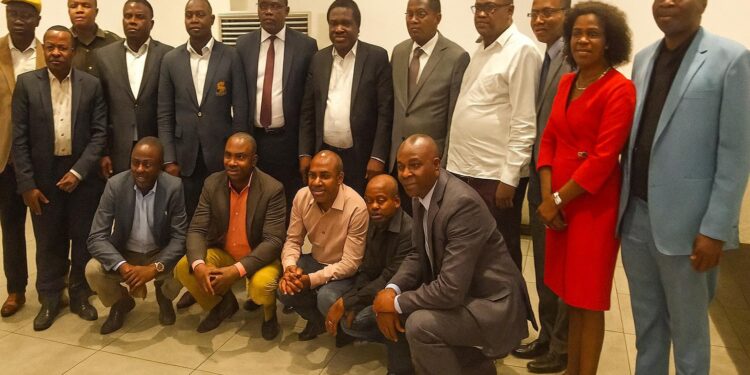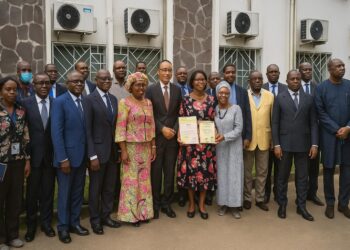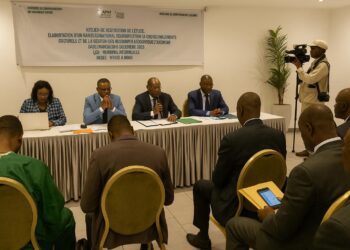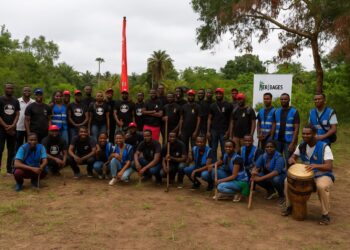Stakeholders embrace ethical timber standards
Brazzaville’s timber industry stakeholders gathered this week under the banner of the Rencontre pour la paix et les droits de l’homme to confront a familiar yet pressing issue: illicit practices that erode confidence in Congo-Brazzaville’s forest governance and hamper the sector’s global competitiveness.
During a two-day workshop funded by Norway’s development agency NORAD and facilitated by Traffic’s Central Africa programme, state officials, private operators and civil-society leaders dissected supply-chain vulnerabilities and brainstormed preventive mechanisms designed to align Congo’s exports with stringent international legality benchmarks.
The initiative forms part of a broader project aimed at strengthening the legality of timber destined for Chinese markets, a goal that echoes Beijing’s own import requirements and supports Congo’s commitments under its Voluntary Partnership Agreement with the European Union.
Training workshop outlines compliance roadmap
Facilitators began by mapping common compliance gaps, from incomplete concession inventories to inconsistent traceability documentation, and encouraged participants to quantify the fiscal leakage these gaps generate for the Treasury and for local communities that depend on forestry royalties for basic public services.
Senior Traffic analyst Patrice Kamkuimo framed the exercise as a pragmatic response to shifting buyer expectations, saying the workshop aimed to help producer countries ‘improve the timber supply chain for major markets’ while preserving revenue that can be reinvested in rural infrastructure.
Working groups drafted a provisional code of ethics and a compliance charter for forest enterprises, emphasising transparent contract disclosure, zero tolerance for informal payments and a duty to consult indigenous populations before any operational expansion.
Participants also endorsed a surveillance network that would pair government inspectors with civil-society observers in high-risk zones, creating an early-warning system for integrity breaches and allowing rapid remedial action before non-compliant logs reach ports.
State backing reinforces reform momentum
The administration welcomed the proposals. Maixan Guillaume Tabaka, Inspector-General of Forest Economy Services, assured delegates of ‘steadfast state support’, adding that existing challenges, while considerable, ‘are not a fatality and can be solved’ through sustained inter-agency coordination.
The ministry is expected to review the draft code and integrate it into forthcoming revisions of the national forestry law, a process that could further clarify sanction scales and formalise the role of independent monitors in concession audits.
Observers note that constructive dialogue between officials and non-state actors has become more frequent since Congo ratified its Forest Code in 2020, signalling an administrative shift towards participatory governance aligned with President Denis Sassou Nguesso’s broader modernisation agenda.
Economic weight of forests guides policy
Forestry remains Congo’s second-largest source of public revenue after hydrocarbons, contributing foreign exchange, jobs and roughly ten percent of non-oil GDP, according to finance ministry data shared during the workshop.
Because international buyers increasingly demand proof of origin and legality, failure to comply risks trade disruptions that could undermine fiscal consolidation efforts and the diversification objectives set in the National Development Plan 2022-2026.
Christian Mounzéo, RPDH national coordinator, argued that an ethical supply chain not only preserves market access but also ensures communities see tangible benefits through tax redistribution, social infrastructure and respect for traditional land rights.
Civil society sharpens oversight tools
To translate commitments into measurable outcomes, delegates proposed quarterly scorecards tracking concession-level infractions, tax recovery rates and the percentage of logs accompanied by verified legality licences.
Transparency International Cameroon offered to host a digital dashboard aggregating those indicators, granting investors, regulators and consumers near-real-time visibility over compliance trends and reinforcing Congo’s reputation as a reliable sustainable-timber origin.
Participants plan a follow-up session in early 2026 to evaluate progress, refine the code of ethics and, if necessary, recommend fiscal incentives that reward companies demonstrating exemplary due diligence.
For now, momentum appears robust: government representatives left the venue with draft decrees in hand, civil-society monitors acquired new investigative tools, and private-sector executives signalled willingness to adopt tighter norms that could unlock premium market segments and boost long-term forest resilience.
Bankers attending the seminar highlighted another benefit: improved compliance could lower the risk premium on forestry loans, enabling operators to modernise sawmills, invest in downstream processing and capture greater value before export, a cornerstone of the government’s industrialisation roadmap.
A representative from a leading concessionaire noted that banks already request legality documentation prior to disbursement, arguing that the proposed scorecards will streamline due diligence and reduce transaction costs for both lenders and borrowers.
Academics present cautioned, however, that capacity gaps within smaller community forests must be addressed through tailored training and accessible finance to avoid a dual-speed sector where only large firms can meet new benchmarks.
In response, RPDH announced a pilot mentorship scheme pairing seasoned compliance officers with cooperatives in Sangha and Likouala, regions where customary tenure is widespread and where inclusive growth could demonstrate the social dividends of the emerging governance model.
Stakeholders left Brazzaville cautiously optimistic, united by a shared vision of credible, transparent timber.












































